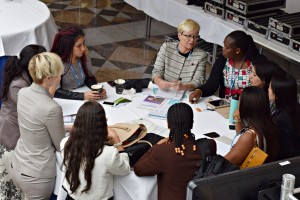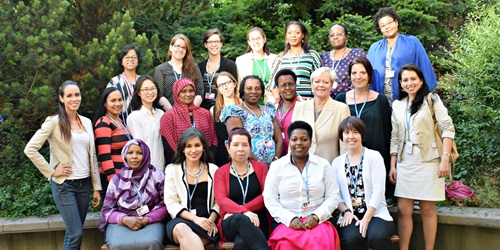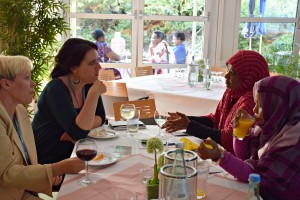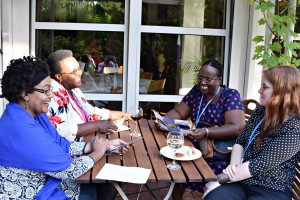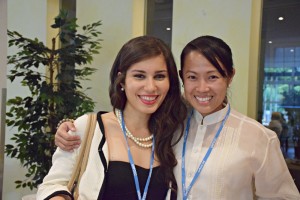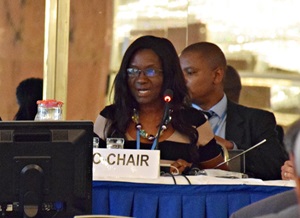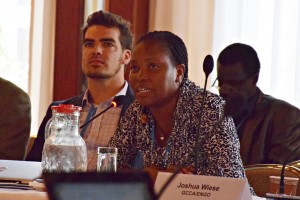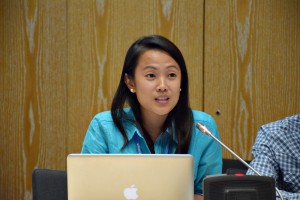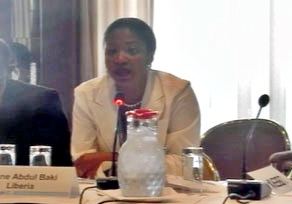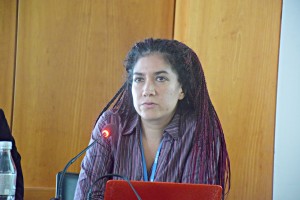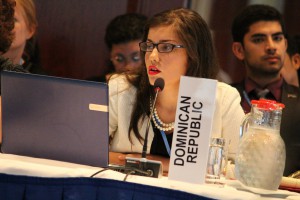NEW YORK (June 26, 2014)– The Women Delegates Fund was founded in 2009 to provide travel support, capacity building and networking opportunities to women from the Global South, particularly those who have both climate change and women’s empowerment expertise, to join and participate on their national delegations at the UNFCCC. The Fund is supported by the Government of Finland, with additional funds from the Government of Iceland.
Now in it’s sixth year of operation, the Women Delegates Fund (WDF) hosted a series of capacity building and networking activities at the UN climate negotiations in Bonn, Germany from 4-15 June, in addition to providing support for eight women delegates to attend the intersessional. Read below for updates and find photos here.
WDF Participants in Bonn
Patience Damptey, Ghana
Shreejana Bhusal, Nepal
Ivete Maibaze, Mozambique
Stephanie Tan, Philippines
Emelda Adam, Tanzania
Emilia Reyes, Mexico
Sieane Abdul-Baki, Liberia
Anniete Cohn-Lois, Dominican Republic
Women Delegates Fund Night School
A common program of the WDF, the a two-evening capacity building session ‘i.e. night school’ entitled “UNFCCC Negotiations Skills and Technical Language” was held from 2-3 June, prior to the start of the negotiations. The night school, open to all delegates engaged in the UNFCCC, is particularly geared toward: 1) women delegates with limited experience in the UNFCCC negotiation process (0-1 years); 2) experienced delegates who are interested in honing their negotiation skills; and 3) delegates interested in broadening their network of delegates working in the UNFCCC.
In Bonn, the night school included 13 participants from 11 countries including Sudan, Fiji, Cook Islands, Mali, Bolivia and the UK. The two night series focused on drafting text for interventions, decisions and other written outcomes of the negotiating process, with the aim of strengthening the participants’ capacity to participate effectively in the negotiating process. The training also included experiential learning through a mock negotiation exercise and provide a set of tools and materials that participants can utilize in upcoming UNFCCC meetings.
One participant shared, “I think the drafting is an essential aspect of negotiations, and this was an essential part of the Night School. I very much appreciate that we spent so much time on it. Especially for people with no legal background, this exercise can be very confusing, so spending more time on the different meanings of the words was very exciting.”
Beyond skills building, the night school provided updates on where the negotiations are in 2014 and important notions on legal form, specifically as we progress towards a new climate agreement. The training also aims to provide a space for engaging with other delegates outside of the ongoing preparatory meetings.
Women Delegates Fund Networking Event
In partnership with UN Women, on Thursday 12 June, WEDO on behalf of the Women Delegates Fund, hosted its 2nd annual informal cocktail reception and networking meeting for women delegates at the UNFCCC. The event was held in light of recent progress in promoting gender balance and improving the participation of women in UNFCCC negotiations. It is one of many actions and initiatives to provide space for: networking and mentorship among women delegates of the UNFCCC, consideration and discussion of strategies for enhanced participation, and to highlight the achievements of women leaders in the negotiations.
Women Delegates in ACTION
The hallmarks of the WDF program include: consistency in participation, networking, training and leadership development. This is not a program aimed only at bringing women to the table, but in creating a step-change in the power dynamics of the UN climate negotiations, and in all relevant bodies, towards one which encompasses women and men’s equal right to participate in decision-making. By ensuring consistency in participation as well as capacity building, in Bonn we saw WDF delegates taking real leadership on behalf of their countries, coordinating negotiating groups on agenda items, chairing meetings, and delivering presentations and interventions. See some of these examples below:
WDF IMPACT
The WDF was established in 2009 as a response to the low numbers of women in national delegations at the UNFCCC negotiations. On average, only 32 percent of the delegates in the period 2008 – 2012, were women. Since 2009, 1) initiatives and networking led by WDF delegates has contributed to groundbreaking gender- responsive text in UNFCCC decisions; 2) female delegate representation at 34% in 2013- the highest ever; 3) enabled the participation of 35 women delegates from 28 countries, otherwise unable to attend UNFCCC meetings, to engage effectively across 18 meetings of the UNFCCC, totaling some 140 sponsored trips; 4) 70+ additional delegates reached through pre-sessional night schools and capacity building; 5) reached over 3000 climate negotiators and decision makers through various events.


